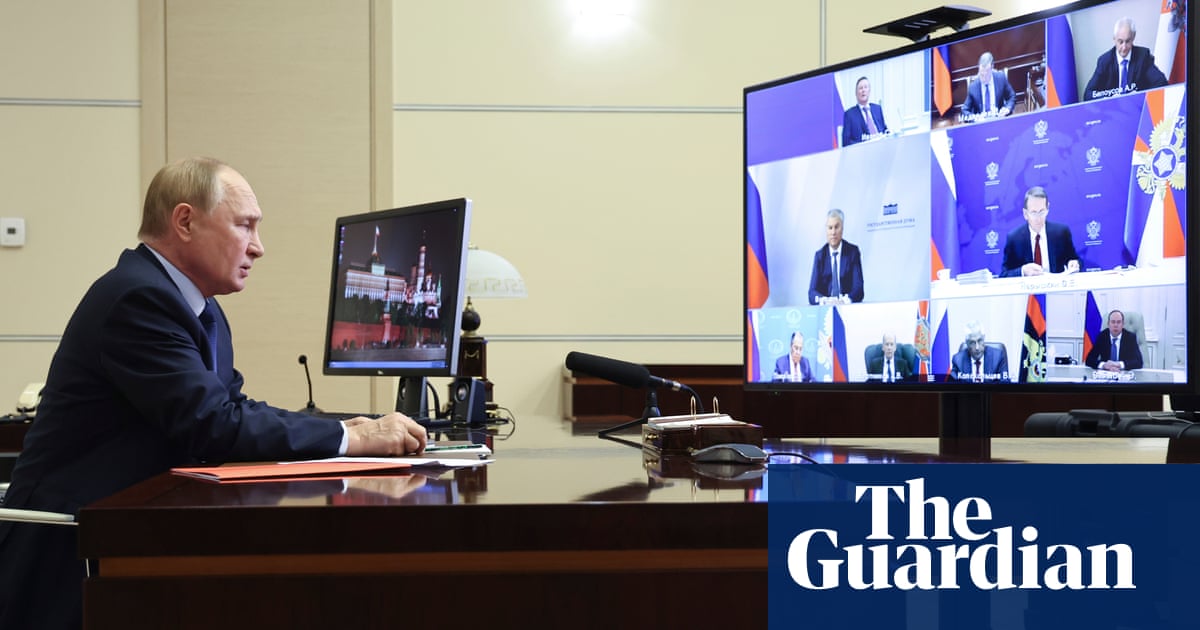US officials and lawmakers have shot back at Vladimir Putin after the Russian leader said that Nato’s potential lifting of restrictions on Ukraine to launch long-range strikes into Russia would mean Nato countries were “at war” with Russia.
The prime minister, Keir Starmer, is meeting with the US president, Joe Biden, on Friday at the White House, where the two are expected to discuss – though not necessarily announce – a loosening of restrictions on Storm Shadow missiles that would allow Ukraine to strike targets as far as 155 miles inside Russia.
“This will mean that Nato countries – the United States and European countries – are at war with Russia,” Putin told Russian reporters on Thursday. “And if this is the case, then, bearing in mind the change in the essence of the conflict, we will make appropriate decisions in response to the threats that will be posed to us.”
The missiles are jointly produced in the UK and France, and both countries appear to be seeking Biden’s go-ahead to loosen restrictions on the use of the long-range missiles. Western officials have indicated that the US is not planning to allow its own missiles to be used to strike targets deeper inside Russia.
Washington and London have indicated they do not plan to announce a change in policy. Moscow’s ambassador to the UN told the security council on Friday that loosening the restrictions would mark an escalation to “direct war” between Moscow and Nato.
The remarks have provoked an angry response in Washington, where officials accused Putin of sabre-rattling in order to scare Nato countries away from supporting Ukraine.
Senator Jim Risch, the ranking member of the Senate foreign relations committee, said that Ukraine should have authorisation to strike targets deep inside Russia, including active Russian bombers launching missiles against Ukrainian cities.
“Putin’s latest threats about direct confrontation with Nato are simply an effort to coerce the west out of supporting Ukraine,” Risch said. “He knows that long-range strikes from Ukraine would cause significant damage to his war effort. Several Russian missiles have landed in Nato territory and Nato has not escalated.
“Ukraine must be allowed to defend itself, period. If that means striking a Russian bomber launching missiles at Ukrainian civilians from Russian airspace, then Ukraine should be able to take that shot,” he added.
Speaking with reporters on Friday, the US national security council spokesperson, John Kirby, said that there would probably be no announcements about the lifting of restrictions on Ukraine’s use of British and French-supplied missiles in Ukraine.
But at the same time, he said that the US and its Nato allies have “our own calculus for what we decide to provide to Ukraine.”
“I never said that we don’t take Mr. Putin’s threats seriously. He starts brandishing the nuclear sword, for instance, yeah, we take that seriously. We constantly monitor that. He obviously has proven capable of aggression. He’s obviously proven capable of escalation … But it is not something that we haven’t heard before. So we take note of it. We got it,” Kirby said.
after newsletter promotion
Biden and Starmer are meeting for the second time at the White House after last month’s Nato summit, which was held just days after Labour won the UK general election and retook power after 14 years in opposition.
The two leaders are expected to discuss a host of foreign policy topics, including Ukraine, the conflict in the Middle East, the Aukus partnership between the UK, Australia and US, and more.
The Ukrainian leader, Volodymyr Zelenskiy, is expected to present his “victory plan” to Biden on the sidelines of the UN general assembly later this month. Pressure is growing on Ukraine in the run-up to the US presidential elections, which could see Donald Trump return to power.
As fevered discussions over the future of the war take place behind closed doors, Washington and its allies have continued to pledge to stand behind Ukraine in the war.
“We are going to do everything that we can so that Ukraine has what it needs to defend itself,” said the White House press secretary, Karine Jean-Pierre, on Friday. “That is our commitment. I think you have seen this, a very much focused, a tremendous amount of support from this administration and also from our partners and allies in doing just that. And that’s what you could expect to see.”

